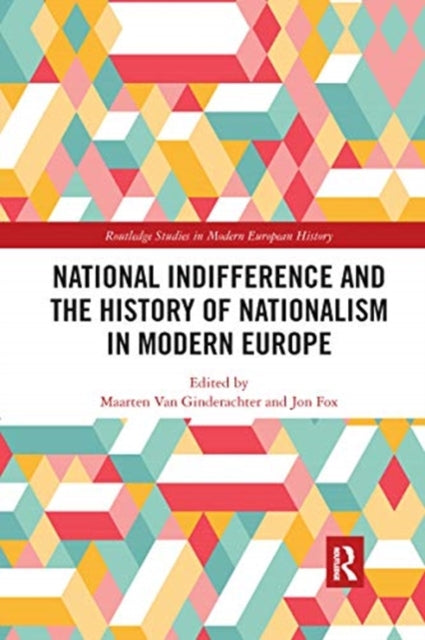Shulph Ink
National indifference and the History of Nationalism in Modern Europe
National indifference and the History of Nationalism in Modern Europe
YOU SAVE £1.73
- Condition: Brand new
- UK Delivery times: Usually arrives within 2 - 3 working days
- UK Shipping: Fee starts at £2.39. Subject to product weight & dimension
Bulk ordering. Want 15 or more copies? Get a personalised quote and bigger discounts. Learn more about bulk orders.
Couldn't load pickup availability
- More about National indifference and the History of Nationalism in Modern Europe
National indifference challenges the notion of mass character of nationalism in East Central Europe at the turn of the nineteenth and twentieth century, suggesting that ordinary people were not in thrall to the nation and were often indifferent, ambivalent, or opportunistic. This volume brings together experienced scholars with the next generation to push the boundaries of national indifference 2.0.
\n Format: Paperback / softback
\n Length: 262 pages
\n Publication date: 30 September 2020
\n Publisher: Taylor & Francis Ltd
\n
The concept of national indifference has emerged as one of the most groundbreaking notions in the study of nationalism in recent years. It challenges the notion that nationalism was a widespread phenomenon among ordinary people in East Central Europe during the turn of the nineteenth and twentieth centuries. Instead, the literature suggests that ordinary people were often indifferent, ambivalent, or opportunistic when dealing with issues of nationhood.
As with any groundbreaking research, the literature on national indifference has not only revolutionized our understanding of nationalism but has also raised a new set of challenges. This volume brings together experienced scholars with the next generation in a collaborative effort to push the geographic, historical, and conceptual boundaries of national indifference 2.0.
One of the key insights of the literature on national indifference is that nationalism was not a universal experience but was shaped by a range of social, economic, and cultural factors. Different groups of people had varying levels of attachment to their nation, and their attitudes towards nationhood were influenced by their experiences, beliefs, and social networks.
For example, some ordinary people may have been deeply committed to their nation and seen it as a source of identity and pride. Others, however, may have been more indifferent or ambivalent, viewing nationhood as a means to achieve personal or economic gains. Some may have even been opposed to nationalism, seeing it as a threat to their local or cultural traditions.
Another important aspect of the literature on national indifference is that it has challenged the notion that nationalism was a product of the elite or the ruling classes. Instead, it suggests that nationalism was a grassroots movement that emerged from the experiences and struggles of ordinary people. Ordinary people were not passive recipients of national ideologies but active participants in the construction and negotiation of national identities.
The literature on national indifference has also shed light on the complex and often contradictory ways in which ordinary people negotiated their national identities. Some people may have embraced their national identity wholeheartedly, while others may have struggled with it or rejected it altogether. People may have experienced multiple national identities, or may have shifted their allegiances between different nations over time.
Furthermore, the literature on national indifference has raised important questions about the role of the state in shaping national identities. The state may have played a significant role in promoting national unity and identity, or it may have been a source of division and conflict. The state may have used nationalism as a tool to legitimize its power or may have attempted to suppress or marginalize nationalist movements.
In conclusion, the concept of national indifference has revolutionized our understanding of nationalism and has revealed a new set of challenges. The literature on national indifference suggests that nationalism was not a universal experience but was shaped by a range of social, economic, and cultural factors. Ordinary people were not passive recipients of national ideologies but active participants in the construction and negotiation of national identities. The literature has also challenged the notion that nationalism was a product of the elite or the ruling classes and has shed light on the complex and often contradictory ways in which ordinary people negotiated their national identities. The state may have played a significant role in shaping national identities, but it may also have been a source of division and conflict. As we continue to explore the complexities of nationalism, it is important to continue to engage with the literature on national indifference and to consider its implications for our understanding of the world.
\n Weight: 426g\n
Dimension: 155 x 233 x 35 (mm)\n
ISBN-13: 9780367661922\n \n
This item can be found in:
UK and International shipping information
UK and International shipping information
UK Delivery and returns information:
- Delivery within 2 - 3 days when ordering in the UK.
- Shipping fee for UK customers from £2.39. Fully tracked shipping service available.
- Returns policy: Return within 30 days of receipt for full refund.
International deliveries:
Shulph Ink now ships to Australia, Belgium, Canada, France, Germany, Ireland, Italy, India, Luxembourg Saudi Arabia, Singapore, Spain, Netherlands, New Zealand, United Arab Emirates, United States of America.
- Delivery times: within 5 - 10 days for international orders.
- Shipping fee: charges vary for overseas orders. Only tracked services are available for most international orders. Some countries have untracked shipping options.
- Customs charges: If ordering to addresses outside the United Kingdom, you may or may not incur additional customs and duties fees during local delivery.


